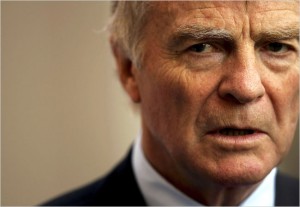Mosley says big changes are required in 2010
 FIA president Max Mosley has written a letter to FOTA chairman Luca di Montezemolo outlining his thoughts on the “really big changes” required in 2010 to ensure the survival of the Formula One Championship. The full letter is here and it makes for some interesting reading.
FIA president Max Mosley has written a letter to FOTA chairman Luca di Montezemolo outlining his thoughts on the “really big changes” required in 2010 to ensure the survival of the Formula One Championship. The full letter is here and it makes for some interesting reading.
A standard gearbox and underbody is proposed for 2010 and the FIA will shortly produce a list of chassis parts and systems which will be the only elements of the chassis which can be developed. All remaining chassis elements will be either standard or frozen.
Mosley also wants to discuss the use of KERS and how it can be developed without incurring significant costs for the teams. KERS has been a controversial addition to the 2009 regulations with teams spending huge sums developing the devices and it is not known how many teams will acutally use the device when the championship begins in two months. There are two different kinds of KERS devices: one that stores electrical energy using batteries and capacitors and one that uses a flywheel to store kinetic energy. Most teams have opted to develop an electrical device but in the letter Mosley suggests that these will be banned in future:
We are increasingly of the view that the use of chemical storage (in particular batteries) should be prohibited in Formula One owing to the unsuitability of the batteries currently available. There are at least two mechanical or electro-mechanical systems under development for Formula One and there may be others as well as hydraulic systems. Formula One would benefit from systems with more capacity than the present 400KJ, 60KW, (for example maxima of: 2MJ stored, 150KW in, 100KW out) but still very small and very light, as is essential in Formula One. These figures are theoretically possible with mechanical devices, but not feasible in the foreseeable future using batteries and/or capacitors. Such non-chemical devices, if successfully developed, would have a very significant impact on road transport and other applications.
Mosley also mentions such radical ideas as reversed grids, allocating leading grid places by lot, giving the World Championship to the driver with most wins and so on but rightly points out that once a faster car gets in front it tends to drive away.
In the letter he also says:
there is no rational argument to support the continued use in Formula One of expensive technologies which have no relevance outside the sport and are unknown (and thus of no interest) to the general public.
I think he makes some good points. Standardising components that most people don’t care about (or may not even be aware of) makes sense but F1 should be the pinacle of motor racing. It should showcase not just the best drivers but also the best engineers and technology. While reducing the engine rev limt to 17,000 should provide cost savings and I doubt we will notice the drop in revs care must be taken when messing with such a vital part of a racing car as the engine. I don’t care if all the cars have the same underbody and I don’t really mind if they all use the same gearbox but there still needs to be some scope for the engineers to make a difference. It’s not just the drivers that are competing on Sunday it’s also the pit crew, the team managers and the car designers.